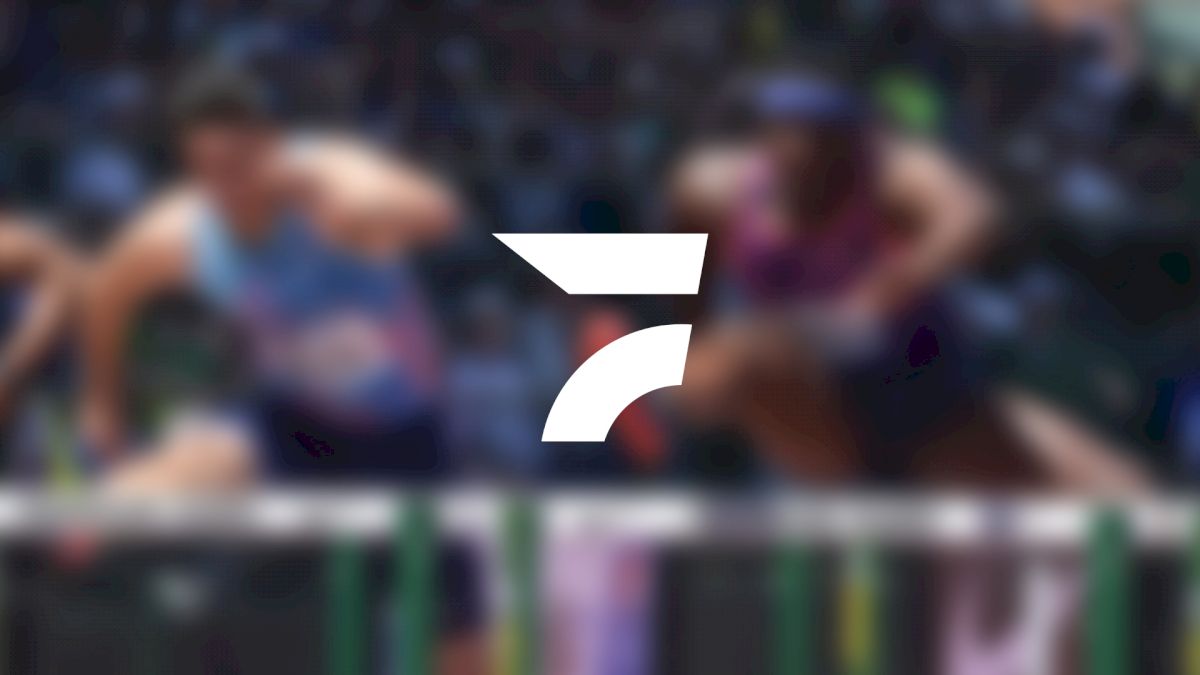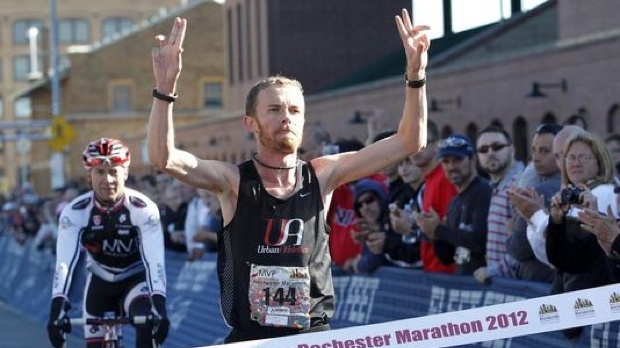NYC Half MarathonMar 13, 2015 by Joe Battaglia
NYC Half Springboard To Trials For Jerry Faulkner
NYC Half Springboard To Trials For Jerry Faulkner



By Sarah Gearhart
Jerry Faulkner walked into the New York Athletic Club rosy-cheeked and spirited, as though the 10-mile run he just finished in Central Park was a like walk in the park.
It practically was for Faulkner, one of the top distance runners in New York City — and also in the nation. He placed 29th overall at the 2014 New York City Marathon with a time of 2:26:31. But it was also part of his preparation for the United Airlines NYC Half Marathon on March 15. When he steps to the start line for it, he’ll be thinking about his dream in the making, to ultimately qualify for the 2016 Olympics Trials. This New York Road Runner race is a steppingstone.
Since April 2013, Faulkner has been a member of the New York Athletic Club (NYAC), which is a private athletic club renowned for developing Olympians and has sent athletes to every modern Summer Games, with the exception of the U.S.-boycotted 1980 Moscow Games. NYAC athletes from an array of sports — including boxing, judo, rowing and track and field — have won 248 Olympic medals, 131 of them have been gold.
Browse the men’s road roster, and Faulkner’s name appears four spots above Meb Keflezighi, winner of the 2014 Boston Marathon and one of the most recognizable names in distance running. Faulkner is appreciative when he talks about what it means to be part of NYAC. Runners like Keflezighi, whom he greatly admires, push him to his edge.
READ MORE: Big Names Will Meet In NYC Half
As relaxed as Faulkner seemed about his run in Central Park, his second training session of the day, he is meticulously calculated about logging miles. He wants to qualify for the “B” standard (2:18) for the 2016 U.S. Olympic Team Trials Marathon.
“I’m pretty good at putting pressure on myself,” Faulkner said. “This is New York. Everyone always wants something better.”
Faulkner is aiming to finish the 13.1-mile course in 67 minutes, a 5:08-mile pace. The top 12 runners male and female runners in the open division each win prize money — the winner in 2015 receives $20,000; 12th place gets $150.
Not that Faulkner runs for the money, although he said if won any, he’d celebrate by eating sushi. Rather, he’s made his way into the sub-elite category simply out of an overwhelming desire to prove himself. He thrives on competition.
But how does a guy whose relatively late entry into the sport at age 19, when he quit his first practice after the first mile, find himself here, preparing to face some of the top runners in the world, at one of the most prestigious half marathons in the nation? Last year’s race drew Kenyan Geoffrey Mutai, who won in 1:00:50, and Olympic gold medalist Mo Farah of Great Britain, who finished second (1:01).
NYAC teammate James Kelly points to Faulkner’s infectious enthusiasm for the sport and his consistency, which he described as impressive, especially considering his marathon volume — about three a year — and quick recovery between each.
Faulkner has run 21 marathons, three of which he won: the 2006 Oklahoma City Memorial Marathon, 2008 Route 66 Marathon (ran a course record, 2:27), and the 2012 Rochester Marathon (broke the course record, at 2:26). His marathon best is 2:24, achieved at the Fargo Marathon in 2011.
And yet he’s hasn’t lost his motivation. If anything, he can’t seem to contain himself.
Faulkner’s 6-foot, 130-pound frame doesn’t seem as though it can handle the 2,000-calorie meals he eats to recover from long runs. Recently, one recovery meal included two eight-ounce steaks, heaping piles of white rice and vegetables. And for morning runs, he prefers white rice with soy sauce and a pinch of salt. He needs the calories to prevent his weight from dropping, sometimes to 124, when he over-trains.
“He keeps me on my toes,” said Kelly, a Harvard graduate whose marathon best is 2:19. Kelly and Faulkner trained together for the NYC Half and the 2015 Boston Marathon, on April, 20.
“One of the hallmarks of people who reach Jerry’s level and the level of some of the other guys in the club is the ability to reproduce their best performances,” Kelly added, “What sets Jerry apart is his ability to drag himself through three to four marathons a year, running the same times in lousy conditions and on difficult course. It’s pretty remarkable.”
Faulkner prefers to go the hard route. He often runs counterclockwise in Central Park for more hills — even after standing on his feet all day as a product lead for the Nike Running Flatiron store. Sometimes NYAC coach Tom Fleming has to tell Faulkner, who averages 98 miles a week, to cut back.
“He exemplifies one of the issues with young athletes today who are trying to come up. They have to work and survive, find time to race and travel,” said Fleming, a two-time New York City Marathon champion. “He’s willing to do anything. His greatest attribute is his desire.”
Faulkner learned the value of investing himself when he was a freshman at St. Gregory’s University, where he attended on a golf scholarship. A friend convinced him to join the cross-country team and Faulkner easily relented.
But the first day of practice, which involved mile repeats, proved too challenging. And he cut out from the workout after the warmup. He spent the remainder of practice next to his coach in a truck as they drove alongside teammates and recorded splits.
Still, that didn’t deter Faulkner from showing up again. He wanted to test his survival mode, he said. It didn’t take long for his initial 7-minute pace to drop to 5:10 by sophomore season. He red-shirted as a junior due to a stress fracture, but recovered to run his best 8K, 24:30 minutes, as a senior.
Faulkner turned his attention to the marathon in 2005, when he ran the Oklahoma City Memorial Marathon in 2:32. He trained 90 miles a week, mile repeats at a 4:50 pace and tempo runs at a 5:15 pace to prepare for it. He blames dehydration for his second-place finish.
In April, a more experienced Faulkner will aim to run the Boston Marathon between 2:18-2:20, which would be his fastest marathon time to date. The NYC Half will serve as a hard training run and a way to mentally prepare for Boston.
And much like his early days in the sport, he said he’s still in survival mode, relying on the mindset that he can negotiate his fate — qualify for the Trials — if he continues to work hard enough.
RELATED CONTENT
Dathan Ritzenhein Adjusts Back To Michigan Life Ahead Of NYC Half